#here in vulgate cycle
Text
Arthurian Knighthood and Guinevere's Sword
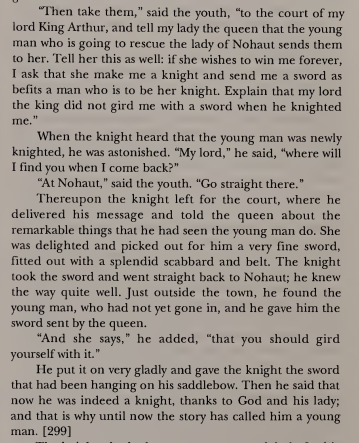
[...]
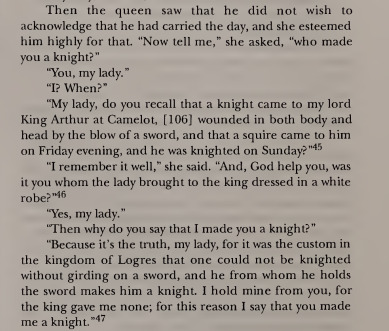
As a modern person, this SHOULD be in more Arthuriana:
Guinevere giving Lancelot his sword - it is symbolic of his:
coming-of-age,
entry into knighthood,
establishing of his relationship with Guinevere, in both Romantic AND Feudal contexts
AND, the granting of Martial Prowess from a Lady (in a sanitized, Medieval Gender-conforming context). Possibly being an expression of that Lady's own martial potential.
Like, this plot thread reeks of some kind of Mentor-Student relationship that normally would be between male characters, but instead, its between an "Older and Wiser Female" and "Younger, Inexperienced Male" (compared to Tristan and Isolde, where its Tristan who teaches Isolde at her mother's behest).
It's like Scathach and Cu Chulainn. Obviously, Guinevere could never be allowed by medieval writers to teach Lancelot martial arts but the implicit allegory in place for us to take advantage of, especially in this era where Guinevere can fight and/or be a warrior queen.
It helps that Guinevere has her own cadre of young knights that she rears and maintains:
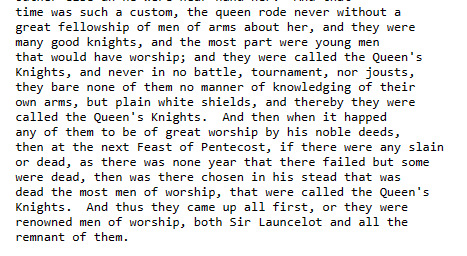

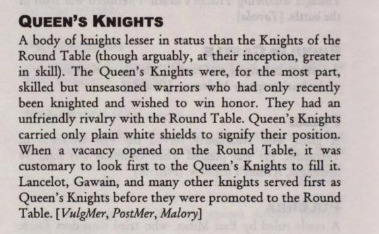
Its basically a kind of feeder school.
Hell, I would make the sword Guinevere gives as Arondight, the sword of Lancelot from Bevis of Hampton (and weirdly hyped-up in Japanese Media). The sword would have been Guinevere's personal weapon since her maiden days, and the passing of this weapon to Lancelot represents
Guinevere retiring from her own Martial Career
Lancelot, in becoming her champion, acts as an extension of Guinevere's prowess, stuff she can't be doing anymore as a court lady and Queen and now must work through proxy.
Lancelot becoming, in a sense, a successor of Guinevere's legacy
#god#there is so much i want to say about this#it drives me NUTS#I AM UNWELL#there is so much potential here for modern writers#here in vulgate cycle#but english writers are too hung up on Malory-Tennyson-White's version of Lancelot and Guinevere#vulgate is just so much more different in context#sir lancelot#queen guinevere#literary knighthood#swords#bevis of hampton#arondight#arthuriana#arthurian legend#arthurian mythology#arthurian legends#vulgate cycle
17 notes
·
View notes
Text
Okay there’s like a whole post I wanna make on Mordred and Guinevere but I was reading Mordred’s usurpation in the Vulgate and I forgot how funny Mordred’s fake Arthur letter is
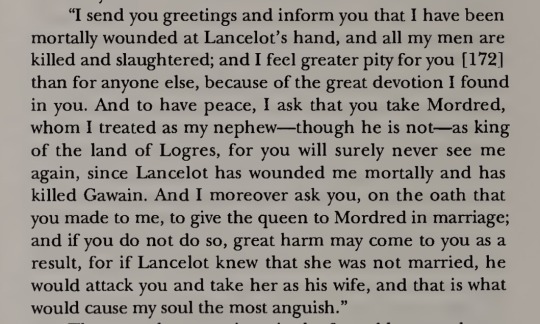
“Yes I am Arthur and I am currently dying. You should definitely make Mordred king. Because I will be dead. Also he should totally marry Guinevere. It is very important that he marry Guinevere.”
Like I know that was Mordred’s first draft and he was just really banking that none of the Barons would ask questions (and they didn’t so I guess he was right).
#I want to make a post about Mordred’s pursuit of Guinevere in the Vulgate#and how it is like technically divorced from his claim to the throne here#like marrying Guinevere is something he tacks on for his own love for her not in an effort to gain legitimacy as king#and then in the Post-Vulgate it’s just kind of quickly said that he also loved Guinevere this whole time and wanted to marry her#and by Le Morte there’s not really a reason given for the attempted marriage#and the way the few modern interpretations that even use it seem to view it as a political choice instead of the personal one it was#but also this letter is so funny I see why all the other version jsut say there was a letter instead of actually writing it#Mordred#Guinevere#Arthuriana#vulgate cycle#mordred x Guinevere
127 notes
·
View notes
Text
Beginner’s Guide to Medieval Arthuriana
Just starting out at a loss for where to begin?
Here’s a guide for introductory Medieval texts and informational resources ordered from most newbie friendly to complex. Guidebooks and encyclopedias are listed last.
All PDFs link to my Google drive and can be found on my blog. This post will be updated as needed.
Pre-Existing Resources
Hi-Lo Arthuriana
♡ Loathly Lady Master Post ♡
Medieval Literature by Language
Retellings by Date
Films by Date
TV Shows by Date
Documentaries by Date
Arthurian Preservation Project
The Camelot Project
If this guide was helpful for you, please consider supporting me on Ko-Fi!
Medieval Literature

Page (No Knowledge Required)
The Vulgate Cycle | Navigation Guide | Vulgate Reader
Culhwch and Olwen
The Wedding of Sir Gawain and Dame Ragnelle
The Marriage of Sir Gawain
Sir Gawain and The Green Knight
The Welsh Triads
Le Morte d'Arthur by Sir Thomas Malory
Squire (Base Knowledge Recommended)
The Mabinogion
Four Arthurian Romances by Chrétien de Troyes
King Artus | scan by @jewishlancelot
Morien
Knight (Extensive Knowledge Recommended)
The History of The King's of Britain by Geoffrey of Monmouth
Alliterative Morte
Here Be Dragons (Weird or Arthurian Adjacent)
The Crop-Eared Dog
Perceforest | A Perceforest Reader | PDF courtesy of @sickfreaksirkay
Wigalois | Vidvilt
Guingamor, Lanval, Tyolet, & Bisclarevet by Marie of France
The Canterbury Tales by Geoffrey Chaucer
Grail Quest
Peredur (The Mabinogion)
The Story of the Grail + 4 Continuations by Chrétien de Troyes
Parzival by Wolfram von Eschenbach
The Crown by Heinrich von dem Türlin (Diu Crône)
The High Book of The Grail (Perlesvaus)
The History of The Holy Grail (Vulgate)
The Quest for The Holy Grail Part I (Post-Vulgate)
The Quest for The Holy Grail Part II (Post-Vulgate)
Merlin and The Grail by Robert de Boron
The Legend of The Grail | PDF courtesy of @sickfreaksirkay
Lancelot Texts
Knight of The Cart by Chretien de Troyes
Lanzelet by Ulrich von Zatzikhoven
Spanish Lancelot Ballads
Gawain Texts
Sir Gawain and The Green Knight
The Wedding of Sir Gawain and Dame Ragnelle
The Marriage of Sir Gawain
Sir Gawain and The Lady of Lys
The Knight of The Two Swords
The Turk and Sir Gawain
Perilous Graveyard | scan by @jewishlancelot
Tristan/Isolde Texts
Béroul & Les Folies
Prose Tristan (The Camelot Project)
Tristan and The Round Table (La Tavola Ritonda) | Italian Name Guide
The Romance of Tristan
Tristan and Iseult by Gottfried von Strassburg
Byelorussian Tristan
Educational/Informational Resources
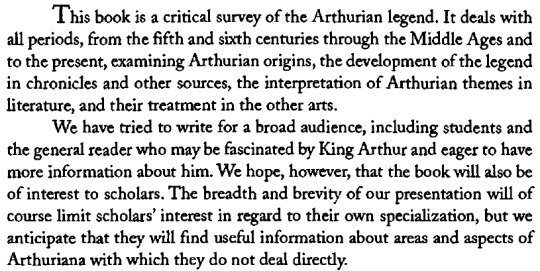
Encyclopedias & Handbooks
Warriors of Arthur by John Matthews, Bob Stewart, & Richard Hook
The Arthurian Companion by Phyllis Ann Karr
The New Arthurian Encyclopedia by Norris J. Lacy
The Arthurian Handbook by Norris J. Lacy & Geoffrey Ashe
The Arthurian Name Dictionary by Christopher W. Bruce
Essays & Guides
A Companion to Chrétien de Troyes edited by Joan Tasker & Norris J. Lacy
A Companion to Malory edited by Elizabeth Archibald
A Companion to The Lancelot-Grail Cycle edited by Carol Dover
Arthur in Welsh Medieval Literature by O. J. Padel
Diu Crône and The Medieval Arthurian Cycle by Neil Thomas
Wirnt von Gravenberg's Wigalois: Intertextuality & Interpretation by Neil Thomas
The Legend of Sir Lancelot du Lac by Jessie Weston
The Legend of Sir Gawain by Jessie Weston
#arthuriana#arthurian legend#arthurian mythology#arthurian literature#king arthur#queen guinevere#sir gawain#sir lancelot#sir perceval#sir percival#sir galahad#sir tristan#queen isolde#history#resource#my post
678 notes
·
View notes
Text
No, Sir Galahad is not in the Bible, and I never said he was.
OK, so in my series of posts and lectures about my work on Neil Gaiman's Chivalry, I pointed out that Sir Galahad's first appearance in Arthurian fiction was in the Vulgate, and that his name was originally spelled Galaad. Therefore the spelling in Neil Gaiman's Chivalry is correct, and Galahad is a later variant spelling.
Someone recently took me to task for saying this meant that I claimed Sir Galahad was in the Bible, and yet Sir Galahad appears nowhere in the Bible.
I never said Sir Galahad was in the Bible.
I said he was in the Vulgate.
Vulgate means "common version" in Latin.
The confusion here stems from the word "vulgate" which often refers to the 4th century Latin translation of the Bible commonly known as the Vulgate Bible.
But "vulgate" is also a term used to refer to The Lancelot-Grail Cycle, a 13th century French Arthurian cycle which is also known as the Vulgate or Vulgate Cycle -i.e. common version. Later translations of this work are known as Post-Vulgate.
Specifically, Galahad or Galaad appears in the Vulgate Queste del Saint Graal.
Happy to help.
Chivalry is available wherever fine books are sold, and you can come see me at the San Diego Comic Con Museum on October 4 where I will be signing and lecturing and showing art. Thanks.
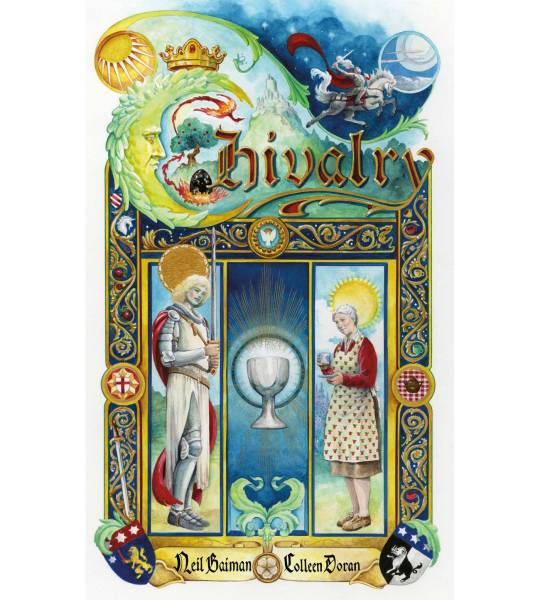
2K notes
·
View notes
Text
So far Diu Crône is a hilarious read because you can tell the author had massive beef with the French treatment of the legend and how it handled Arthur and just...actively and enthusiastically rejects any plot lines related to it.
Arthur? Is a good man who has the respect and honor of all of his people. Succeeds in the virtue test over everybody else in the court.
Lancelot? At peace with himself and has his own lady love.
Guinevere? Happily married to Arthur and absolutely hilarious. I just love her here.
Gawain? Not only does he achieve the Holy Grail, but he becomes immortal.
Camelot? Never falls.
At one point Guinevere's accused of adultery and while Arthur's upset and unsure, he rejects the idea of burning her at the stake because "Wow people would understandably think I'm insane and my reputation would be ruined. Best to wait and see :)" Like I just know that Heinrich von dem Türlin was giving the most BOMBASTIC of side-eyes to the Vulgate Cycle at that moment. I can't believe fandom drama goes that far back.
#arthurian#arthuriana#diu crone#German Arthuriana seems to blend the creativity of the Welsh with the thematic resonance of the French really well#So it might be my favorite branch? I'm not sure...#king arthur#sir lancelot#sir gawain#queen guinevere
113 notes
·
View notes
Note
Heyy, I'm starting to get interested in reading the Arthurian Legend/Story/Mith (?), and I was just wondering if you have any reccomendations on where to start with what books?
I hope you have a nice day, Take care!
Oh thanks for the ask. I can only half answer this? I'm much better with my Greek myths. I've read a fair number of arthuriana texts but there are so many arthuriana blogs on here that faaar outmatch me with regards to the texts they've read.
I would personally start with Gawain and the Green Knight, I think it's a great entry point and one of the strongest texts in arthuriana. If you enjoy that one I think you're pretty much green lit to continue on.
Then it's a bit of a question what you want to do?
If you want an oversight of the "plot" of Arthuriana (ie. the rise and downfall of Camelot, from Arthur's conception to his death) you either want to start with the Vulgate Cycle (long but well written, the translation by Norris Lacy is recommended) or Le Morte D'Arthur by Sir Thomas Malory (based on the Vulgate Cycle, it's shorter but still long, and worse written, but definitely the basis for later/modern arthuriana). These are inaccesible bricks of reading material, I'm still slogging through Le Morte, two years later. But they're pretty much the bedrocks at the bottom of our modern arthuriana "canon" (no such thing but you know what I mean) so :///
If you want more readable later adaptations that cemented our modern arthuriana "canon", you either want Alfred Lord Tennyson's Idylls of the King or The Once and Future King by TH White.
If you want to keep reading short stories set in the Arthuriana world I recommend by personal favorite, the Wedding of Sir Gawain and Dame Ragnelle. I've also been highly recommended The Knight of the Cart by Chretien de Troyes, the introduction of Lancelot and his affair with Guinevere. Courtly love!!!
But here I defer to @queer-ragnelle they can definitely give you a better answer.
Good luck!
#this doesnt even touch on modern classics like a connecticut yankee in king arthurs court#too many texts!!!#answered.liridi
137 notes
·
View notes
Text
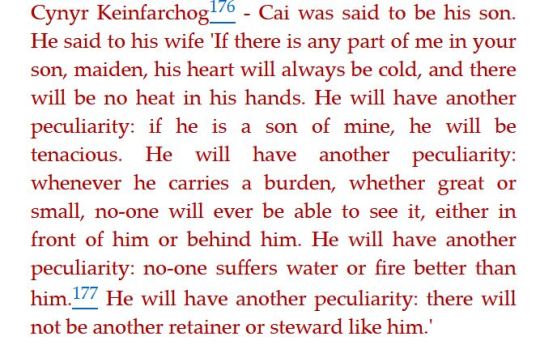

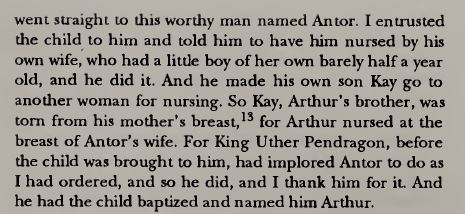


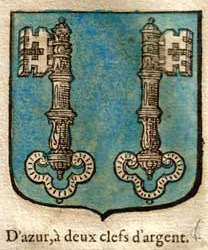
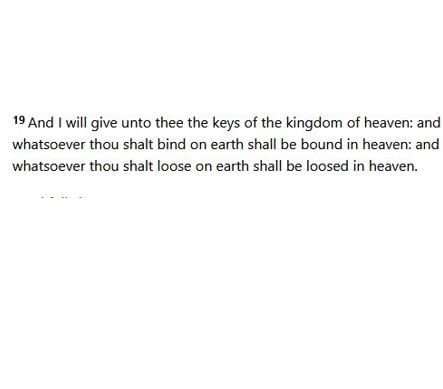
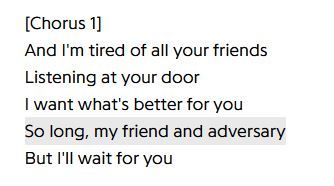
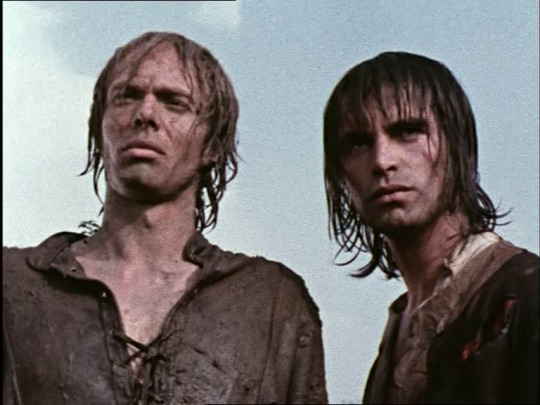
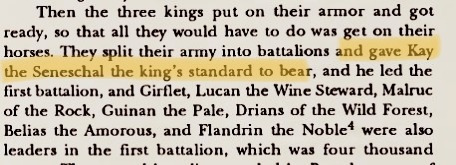
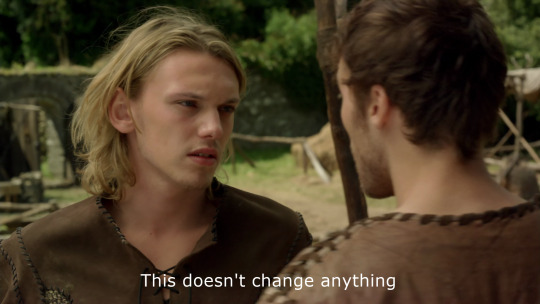




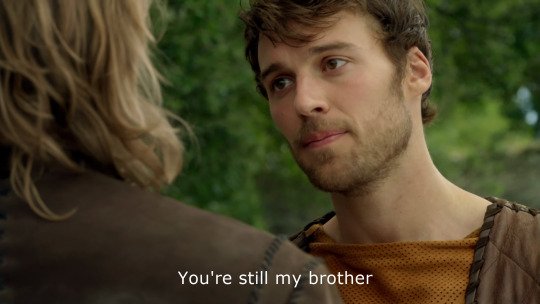


for @queer-ragnelle May Day Parade. May 17-21: Grumpy Month of Kay {Seneschal Celebration}
I have been here since before you became yourself: a collection of Kays (and Arthurs)
Chulhwch and Olwen / Camelot (2011) ep. 1 / Vulgate Cycle: The Story of Merlin / La Morte D'Arthur (Sir Thomas Malory) / The Once and Future King, book 1 The Sword in the Stone (TH White) / Sir Kay's coat of arms / Matthew 16:19 / Under cover of darkness (The Strokes) / Arthur of the Britons (1972) ep. 3 / Vulgate Cycle / Camelot (2011) / Icarus (The Crane Wives) / Idylls of the queen (Phyllis Ann Karr) / Hey Brother (Aviicii) / The High History of the Holy Graal (aka Perlesvaus), trans. Sebastian Evans / Camelot (2011) / Alliterative Morte Arthure, trans. Richard Scott-Robinson / Icarus (The Crane Wives)
#may day parade#arthuriana#sir kay#mine#i'm obsessed with arthuriana brothers you don't know how much#anyways here it is!!! I know st peter kay parallelisms something something but i can't articulate ok just read matthew 16 17-20#if i could make gifs i'd put one wih kay and arthur fighting dirty in arthur of the britons. instead you get a screencap!#also IGNORE the context of the perlesvaus like i did please and thank you (it's all st peter parallelisms until it starts being#judas parallelisms i guess but back to the thing ignore the contents of the perlesvaus for this post <3)#as an Estremely Tired eldest daughter who also works in administration for a living i feel kay the seneschal in my BONES
60 notes
·
View notes
Text
Hey, do you guys want to hear a story? Let me tell you about the romance between Lancelot and Guinevere, as recounted in Sir Thomas Malory's Le Morte d'Arthur.
So, I thought I knew the basics. I grew up reading modern versions of Arthurian legend that focused on other aspects, but had a general knowledge of the Arthur-Guinever-Lancelot love triangle. It didn't show up too much, but I assumed it was subtext in some other versions. What I picked up was that it was sort of pure, almost an ot3, and not the cause of a lot of problems.
My friends. In this version it is NOT SUBTEXT, it DEFINITELY CAUSED PROBLEMS, and it is WILD. It is a true will-they-won't-they drama fest soap opera romance, and I need to share. So please, come on this journey with me.
[I’m looking at you, Black Sails fandom people. I need you to know that Flint canonically would have read this. He would almost certainly have also grown up hearing these stories. I’m not saying he’s Lancelot coded, but I am saying it's interesting that he would have been aware that was something it was possible to be.]
A couple notes, before we dive in. I am very much just summarizing what happened in the book. The thing is, the book is a million pages long and also in Middle English, and this is just one of many plots, which I think is why it's not more widely known. I will show some excerpts so you can get a feel for the text, but you don’t need to read them to understand the story. I'm referring to a version that is as close to the manuscript as I can find, though with spelling regularized. For real fun, see what the original looked like. Malory purports to be translating part of the French Vulgate cycle, which likely is where the character of Lancelot originates, but in fact he is doing much more than translating, and compiles other stories as well. Point being, when he says “so the French book sayeth” etc, that is the “book” to which he is referring. Because of my lack of knowledge about the language and cultural context, this lecture series from Mythgard Academy was absolutely invaluable to my understanding. I cannot recommend it highly enough. Inevitably, some of the opinions of the prof are reflected here. I do not have it in me to compare the scholarship of various medievalists right now, I just want to tell you about this DRAMA.
Let’s start with a prophecy. When Arthur decides he wishes to marry Guinevere, Merlin advises him to take someone else, because if he takes her, she will betray him with Lancelot and it will destroy his kingdom. All of this is foretold, not only to us, but to Arthur himself. Of course he takes her anyway, and all is doomed from the start.
As we begin the main arc of this story (several books after the prophecy), Lancelot is widely acknowledged to be the best and most renowned knight of Arthur’s court. He is plainly and hopelessly in love with Guinevere, and she loves him in return. Arthur doesn’t have a problem with this - who wouldn’t love Guinevere? This sort of love is socially acceptable, so long as they do not sleep together, which would be treason. Arthur in fact seems to support their love, because it means that Lancelot will be Guinevere’s champion should she need one. This is a role Arthur himself legally cannot fill because he is the king, and so would have to be the judge. Lancelot is indeed a good champion for her, and fights for her when she is wrongly accused of murder.
Lancelot is deeply chivalrous, in a way that seems sincere. This is a great place for a first excerpt, a conversation with a Random Damsel Lancelot has been helping:
‘Now, damosel,’ said Sir Lancelot, ‘will ye any more service of me?’ ‘Nay, sir,’ she said, ‘at this time, but almighty Jesu preserve you wheresoever ye ride or go, for the most courteous knight thou art and meekest unto all ladies and gentlewomen that now liveth. But one thing, sir knight, me thinks ye lack, ye that are a knight wifeless, that ye will not love some maiden or gentlewoman. For I could never hear say that ever ye loved any of no manner of degree, and that is great pity. But it is noised that ye love Queen Guenivere, and that she hath ordained by enchantment that ye shall never love no other but her, nor no other damosel nor lady shall rejoice you; wherefore there be many in this land of high estate and low that make great sorrow.’ ‘Fair damosel,’ said Sir Lancelot, ‘I may not warn* people to speak of me what it pleaseth them; but for to be a wedded man, I think it not; for then I must couch with her, and leave arms and tournaments, battles and adventures. And as for to say to take my pleasance with paramours, that will I refuse, in principal for dread of God. For knights that be adventurous should not be adulterers nor lecherous, for then they be not happy nor fortunate unto the wars; for either they shall be overcome with a simpler knight than they be themselves, or else they shall slay by unhap and their cursedness better men than they be themselves. And so who that useth paramours shall be unhappy, and all thing unhappy that is about them.’
So after doing his Knightly Deeds for this damsel, Lancelot asks if she needs anything else. She says no, but you are lacking one thing, which is the love of a woman. It is rumored that is because Guinevere has through sorcery made you love only her, and that causes all of the women great sorrow. In reply Lancelot makes this speech about how he cannot have a wife or paramour and be a good knight, but everyone thinks it is at least in part because his love is reserved for Guinevere.
Now, throughout the book his chastity DOES notably cause all of the women great sorrow. Everyone wants to sleep with Lancelot. Literally he is kidnapped by the four most beautiful queens other than Guinevere, and they say he has to choose one of them as a lover (not even a wife, a lover) or else die. He says he would rather die, though in the end he escapes. This is just an example, truly it is a recurring problem for him. He is, at one point, tricked into sleeping with a woman with whom he conceives his son Galahad (as was prophesied, it's a long story and the romance is only part of it. It is worth mentioning that something similar happens to Arthur, which is how Mordred is sired.) When Guinevere learns that Lancelot has been with someone else, she is angry and banishes him from the court. They still love each other and eventually reconcile.
So, Lancelot goes on the quest for the holy grail. But he fails, specifically because while he is outwardly dedicated to God, in his private heart he is still dedicated to Guinevere. And so he makes a vow to renounce his love for her, acknowledging that it is beyond measure (beyond what is right, even if they have not technically done anything wrong.) However when he returns to Camelot, he cannot keep this vow, as we see.
Then, as the book saith, Sir Lancelot began to resort unto Queen Guenivere again, and forgot the promise and the perfection that he made in the quest. For, as the book saith, had not Sir Lancelot been in his privy thoughts and in his mind so set inwardly to the Queen as he was in seeming outward to God, there had no knight passed him in the quest of the Sangrail, but ever his thoughts were privily on the Queen. And so they loved together more hotter than they did beforehand, and had many such privy draughts together that many in the court spoke of it, and in especial Sir Agravain, Sir Gawain’s brother, for he was ever open-mouthed. So it befell that Sir Lancelot had many resorts of ladies and damosels that daily resorted unto him to be their champion: in all such matters of right Sir Lancelot applied him daily to do for the pleasure of Our Lord Jesu Christ. And ever as much as he might he withdrew him from the company of Queen Guenivere for to eschew the slander and noise, wherefore the Queen waxed wroth with Sir Lancelot.
He and Guinevere start spending a lot of time alone together, and so there are rumors circulating about them in court. In order to put a stop to the rumors, Lancelot starts paying other women attention and doing more good knightly deeds for them. Guinevere is terribly jealous, but he tells her it's for their own good, and also tells her about the vow he made, and his concern that their love is beyond what is appropriate. She is devastated, and weeping banishes him from the court (again).
Lancelot then rides in a tournament, disguised. (Why? Because this is simply a thing knights do.) To make it an effective disguise he takes the token of a woman, the sleeve of the fair maid of Astolat to wear on his helm. When she discovers that he was only using it for the disguise, and he does not indeed love her, she is so heartbroken that she says if he will not marry her or be her lover, she will die. He refuses, on the grounds that love must not be constrained and should arise from the heart, and offers her a thousand pounds a year instead if she marries anyone else. Properly insulted by this, she does indeed die. She has her body sent in a boat to Camelot, with a letter in her hand, saying that she died of her love for him, that he would not return.
Seeing this, Guinevere reconciles with Lancelot, presumably reassured by the fact that he would let this very beautiful much younger woman die of her love rather than being with her. She insists that from now on he will not fight in disguise, and will openly bear her token.
Then Queen Guenivere sent for Sir Lancelot, and said thus: ‘I warn you that ye ride no more in no jousts nor tournaments but that your kinsmen may know you; and at these jousts that shall be ye shall have of me a sleeve of gold. And I pray you for my sake to force* yourself there, that men may speak you worship. But I charge you as ye will have my love, that ye warn your kinsmen that ye will bear that day the sleeve of gold upon your helmet.’ ‘Madam,’ said Sir Lancelot, ‘it shall be done.’ And either made great joy of other.
It is important to keep in mind that, to this point, there is no textual evidence that they were sleeping together, and a great deal of evidence that it was important to Lancelot that they not cross that line. There is much less evidence that this is important to Guinevere.
So then one fateful day in May, Guinevere goes picnicing with an entourage of knights. They are captured by someone else who is in love with Guinevere, and taken back to his castle, but she manages to send a message to Lancelot. At the castle, she insists that her knights sleep in her bedchamber on the grounds that they were wounded in the battle when she was captured and need tending, but truly she wants them there to keep her captor from raping her.
Lancelot arrives to rescue her, and the person who kidnapped her agrees to give her back in the morning. She tells Lancelot to visit her room in the night. He climbs up to her window, which is barred. They have a heartfelt reunion and she says she wishes he could come in to her. He acquiesces and breaks the bars to get into her room, cutting his hand to the bone to do so. Despite the profusely bleeding wound and the ten other men sleeping in the room, they at last do sleep together, in this passionate blood covered consummation. He sneaks back out and replaces the bars.
In the morning, the man who kidnapped Guinevere comes in and sees blood all over the bed. He accuses her of being unfaithful to the king, saying she lay with one of the knights who had been sleeping in her room. She denies it, but it is very clear that she did sleep with someone who was bleeding.
Lancelot says he will fight to defend her from this accusation, which is right and proper because he is her champion. In this story people take trial by combat and oaths before God very seriously, especially Lancelot. He really does try. So he swears an oath that he will prove with his life that Guinevere did not sleep with one of the wounded knights who lay in her room. This of course is TRUE, but only on a technicality. Lancelot, having slept with her himself the night before, is also the one who defends her honor after. I love this story so much.
Instead of fighting him, the kidnapper takes Lancelot captive. In captivity he encounters ANOTHER damsel who insists that sleep with her in order for her to help him. He refuses, still faithful in his heart to Guinevere. Eventually she settles for him holding and kissing her, which is not across the line of appropriateness apparently, giving us some idea of where that line is drawn. Anyway, Lancelot gets out, fights for Guinevere and wins. There are indications that he feels like he barely dodged a devine bullet.
Guinevere and Lancelot return to Camelot. Finally the rumors about them are true, the deed has been done, but of course nothing appears particularly different as there were already rumors about them. Two knights, Mordred and Agravaine, who have been intriguing against Arthur already, go and tell Arthur that Guinevere is being untrue to him. Here is his response:
‘If it be so,’ said the King, ‘wit you well, he is none other; but I would be loath to begin such a thing but I might have proofs of it. For Sir Lancelot is a hardy knight, and all ye know that he is the best knight among us all; and but if he be taken with the deed he will fight with him that bringeth up the noise, and I know no knight that is able to match him. Therefore, and it be sooth as ye say, I would that he were taken with the deed.’ For as the French book saith, the King was full loath that such a noise should be upon Sir Lancelot and his queen. For the King had a deeming of it; but he would not hear thereof, for Sir Lancelot had done so much for him and for the Queen so many times that, wit you well, the King loved him passingly well.
Arthur says he will not hear of this without proof, because if Lancelot is accused and allowed to fight he would beat anyone. And, it is said that Arthur had some idea of the affair, but would not credit it because Lancelot had done so much for him and Guinevere, and he loved Lancelot greatly.
So, one night when the king is away hunting, the two accusers contrive to catch them in the act, with a group of twelve armed knights. They do find Lancelot in Guinevere’s chamber, but the text is notably, pointedly vague about whether they are actually in bed. In any case, Lancelot asks for a trial. The knights say no, they have caught him and so may kill him. He is Lancelot, so he kills all of them instead, save one (Mordred) whom he leaves wounded. Lancelot flees, intending to return to rescue Guinevere and take her to his own castle to protect her from Arthur’s wrath. He maintains her innocence, and still intends that they will all reconcile.
Guinevere is to be burned at the stake (normal in this situation). Lancelot rescues her from the burning at the last moment, killing a number of knights of the round table. Arthur seems to blame the accusers more than Guinevere and Lancelot (for good reason; keep in mind that the romance is a subplot, there is a great deal of political intrigue going on.) Now a war will begin, whether anyone wants it or not, because of the people Lancelot killed. Lancelot takes Guinevere to his own castle. Battle lines are drawn, and Lancelot and Arthur confront each other in the fighting:
And ever was King Arthur about Sir Lancelot to have slain him, and ever Sir Lancelot suffered him and would not strike again. So Sir Bors encountered with King Arthur; and Sir Bors smote him, and so he alit and drew his sword and said to Sir Lancelot, ‘Sir, shall I make an end of this war?’—for he meant to have slain him. ‘Not so hardy,’ said Sir Lancelot, ‘upon pain of thy head, that thou touch him no more! For I will never see that most noble king that made me knight neither slain nor shamed.’ And therewith Sir Lancelot alit off his horse and took up the King and horsed him again, and said thus: ‘My lord the king, for God’s love, stint this strife, for ye get here no worship and I would do my utterance. But always I forbear you, and ye nor none of yours forbear not me. And therefore, my lord, I pray you remember what I have done in many places, and now am I evil rewarded.’ So when King Arthur was on horseback he looked on Sir Lancelot; then the tears burst out of his eyes, thinking of the great courtesy that was in Sir Lancelot more than in any other man. And therewith the King rode his way and might no longer behold him, saying to himself, ‘Alas, alas, that yet this war began!’
So Arthur tries to slay Lancelot, but Lancelot, the better fighter, refuses to slay him and indeed when Arthur is unhorsed Lancelot forbids that he be slain, and gives him his own horse. Arthur weeps for the honor that is in Lancelot, and laments that the war began.
The pope intervenes and tries to negotiate an end. Lancelot confirms that he is willing to return Guinevere to Arthur, and says he has always been willing to do this and will still defend her honor, but that he does not feel he can do so because Arthur has listened to liars and been misled, and he had more reason to take her away than the accusation of adultery - he does not trust she can be safe in that court, with things as they are.
Eventually they do make a deal, with some assurances, and he surrenders Guinevere to the king. He kisses her openly, says that he will leave, but should she be in danger or ever again accused of being untrue, he will fight for her as he always has. He departs the court forever, to much great sorrow, and returns to his own lands.
The war continues - eventually Mordred seizes the throne, Arthur kills him in battle but is mortally wounded himself and passes to Avalon. Following the king’s death, although her love would no longer be adulterous, Guinevere retires to a convent rather than reuniting with Lancelot. He seeks her out, and this is her reaction:
Sir Lancelot was brought before her; then the Queen said to all those ladies, ‘Through this same man and me hath all this war been wrought, and the death of the most noblest knights of the world; for through our love that we have loved together is my most noble lord slain. Therefore, Sir Lancelot, wit thou well I am set in such a plight to get my soul health; and yet I trust through God’s grace and through His Passion of His wounds wide, that after my death I may have a sight of the blessed face of Christ Jesu, and at Doomsday to sit on His right side;* for as sinful as ever I was, now are saints in heaven. And therefore, Sir Lancelot, I require thee and beseech thee heartily, for all the love that ever was betwixt us, that thou never see me no more in the visage. And I command thee, on God’s behalf, that thou forsake my company; and to thy kingdom look thou turn again, and keep well thy realm from war and wrack. For as well as I have loved thee heretofore, my heart will not serve now to see thee, for through thee and me is the flower of kings and knights destroyed. And therefore go thou to thy realm, and there take ye a wife and live with her with joy and bliss. And I pray thee heartily to pray for me to the everlasting Lord that I may amend my misliving.’ ‘Now, my sweet madam,’ said Sir Lancelot, ‘would ye that I should turn again unto my country, and there to wed a lady? Nay, madam, wit you well, that shall I never do, for I shall never be so false unto you of that I have promised. But the self* destiny that ye have taken you to, I will take me to, for the pleasure of Jesu; and ever for you I cast me specially to pray.
Rather than rejoicing in Lancelot’s presence, Guinevere laments that their love brought about the downfall of the Arthurian court, and the deaths of the knights of the round table and King Arthur. She calls upon Lancelot, by all the love that was ever between them to leave her presence, telling him to marry someone else if he wishes and see her no more. Lancelot replies that he wants no one else, and that he will respect her wishes, but will also renounce the world and join a religious order. He asks Guinevere for a final parting kiss, which she denies him.
When Guinevere lies dying of illness, Lancelot sets out to go to her, having had a vision. She knows of his coming, and prays to die before she sees him, because she cannot bear it. She dies a half hour before he arrives, leaving instruction that he is to tend to her body, and then lay it to rest beside that of her lord King Arthur. Lancelot does this with great sorrow, and after ceases to eat or drink, and within weeks is dead himself.
And there you have it, the love affair that doomed Camelot.
HUGE DISCLAIMER: Any and all mistakes or misinterpretations are my own. This is what I gathered, but I am not a medievalist. I am barely an interested layperson. I’m just a random fic writer who got obsessed with research for a story, and had to share this tragic mess.
#i have a million thoughts about this#and there is a great deal of context that would be helpful#but i this doesnt need to be more than 4k words long so#i may do a followup post if there is interest#but black sails folks#i'm writing a lot of flintmadi convos right now#and vaguely planned to have them talk about this book#as a way to discuss their own situation and values#but i had not actually read it#and it is WAY MORE than i expected#anyway they are going to refer back to it#so i figured i should write it down so i can point at it if readers want to know wtf they are talking about#is there an#arthurian legend#tag?#i purposefully haven't looked i don't go here if there is a here to go#but fuck it that was a lot of work might as well see#anyway there are so many things to dig into here#arthur's role or lack thereof#(the rest of the book has a lot more to do with him)#the treatment of fate and prophesy#the courtly love tradition#how this fits into the arthurian tradition as a whole#and the clear french influence#vs the old celtic stories#also so many fun things about language in general#did you know that paramour is derived basically the same way as paramilitary?#'para' as 'beyond that which is regular'#also in middle english negatives are additive rather than canceling each out out!#fun facts
100 notes
·
View notes
Note
Hi! Arthurian legend is one of my favorite subjects but I have trouble figuring out which books to read. Do you have any suggestions?
hi!! here's a couple of popular texts which i'd recommend to start with:
sir gawain and the green knight
culhwch and olwen
lanval
the perilous cemetery/l'atre perilleux (for prime gawain antics)
any chretien de troyes
the vulgate cycle (personally i skipped past the history of the holy grail when starting since it's very long and doesnt really have a lot of the more famous characters and events)
any gerald morris books (he does retellings aimed at children but they're very very funny and very enjoyable even when you're not a child)
i feel like i have to suggest malory's le morte d'arthur because it's le morte d'arthur and a lot of later stuff is based on it but to be honest a lot of it is not that great. book 7 specifically is my favourite section and i would definitely recommend it!!
these are just my personal recommendation for starting out as they're very popular ones and in my opinion quite accessible since they're the ones i started with (and the first four are quite short)
i would definitely suggest also looking at @queer-ragnelle's medieval literature list for links to a lot of different texts including the ones i've mentioned!!
#there are quite a few intro to arthuriana posts floating around so i would also take a look at those!!#i speedran this let me know if you want some less well known recs!!!#the texts i suggested are maybe a little bit basic but theyre popular because they're good#also i havent read a lot of retellings but im pretty sure queer-ragnelle also has retellings on their blog#arthuriana#asks#thanks for asking!!!!! i hope you enjoy these
44 notes
·
View notes
Text
assigning each straw hat pirate a knight of the round table
because I am currently obsessed both with One Piece and Arthuriana; not any kind of serious AU material, just silliness; I Wrote This for Me but You Can Read If You Like
Luffy: Arthur, not due to any similarities in characterization but purely on the functional level - the boy king, the inspirational leader and, as Sun God Nika, a mythical figure believed to return when people need him the most
Zoro: Lancelot, the perfect warrior who embodies that post that's like "it's not my fault that my love language is acts of service and all I know how to do is kill". There is no Queen Guinevere here, so all the undying devotion is aimed at the king instead. Canonically has massive tits. Mihawk is thus implied to be the Lady of the Lake, and I think that's hilarious
Nami: hear me out: Kay. Sharp-tongued, rather cynical, but loyal to a fault to his king/adopted little brother. Nami as part of the Coward Trio vs. Kay being unlucky on quests and generally the butt of the joke. Isn't known to be a great warrior but occupies an important position (navigator vs. seneschal) that keeps the ship/court going. Besides, looking from the opposite direction, I just think Kay deserves to be the hot girl
Usopp: Usopp, sweetie, I'm so sorry, but I gotta say Tristan. Because Tristan is constantly lying about his identity in the most ridiculous manner possible and it somehow works. That part in Le Morte d'Arthur when he's asked what his name is and goes "Tramtrist" and no one suspects a thing even though "Tramtrist" is just "Tristram" with syllables switched around has big Sniper King energy. Also, can't forget the beautiful blonde healer girlfriend
Sanji: oh, that's the easiest one. Gawain. The Maidens' Knight, the ladies' man, a great warrior and one of the king's closest and most trusted men. If you put together Gawain's characterizations from different texts, from SGATGK to Le Morte to the Vulgate & Post-Vulgate to Chrétien de Troyes to everything, you end up with a contradictory character who is simultaneously the best and the worst guy you'll ever meet, which is how I often feel about Sanji, tbh. Would totally fight at a tournament on behalf of a little girl. Has some kind of an epic gay thing with Lancelot
Chopper: Yvain. Son of a sorceress - ah, pardon, a woman of science; associated with animals; known to be nice and kind (the Vulgate Cycle describes him as the one "whose heart will be filled with every kindness"). Occasionally goes insane in the woods (Monster Point), but, like, who doesn't
Robin: try as I might, I can't pull any direct parallels out of my ass, but I do think that narratively she can be seen as kind of a quasi-Mordred. Since her very childhood she was proclaimed to be bad news and expected to eventually cause a catastrophe, but where Mordred, whom no one tries to persuade the prophecy doesn't define him, ends up becoming exactly what he's expected to become, Robin has people who support her and trust her even after witnessing her be the bad guy in the past, so she never becomes the evil others expect her to turn into
Franky: Sagramore the Desirous (or the Unruly, depending on the text/translation) is a big, strong, good-natured knight who probably has low blood sugar needs to have a snack after fighting because otherwise he'll pass out, much like a certain cyborg needs his cola. In the Post-Vulgate, he and Mordred were raised together, which can be linked to Frobin's fates being intertwined since childhood, because I've Connected the Dots (you didn't connect shit)
Brook: I wanted to pick a character of the older generation who nevertheless isn't a mentor figure to Arthur, and I struggle to think of a better option than Pellinore - not the predatory piece of shit in the medieval texts, but the eccentric but loveable old man in Camelot (1967). Brook is also on a quest focused on an extraordinary beast! Only he's not hunting it, he's trying to get back to it because that beast is his friend 🥺
Jinbei: I honestly don't remember if he counts as the Knight of the Round Table, but I am hereby appointing him Ector - Arthur's adoptive father and one of the nicest parental figures in Arthuriana (and probably one of the nicest people in Arthuriana, period). I've also considered Galehaut for the "(partially) non-human ruler who allies himself with Arthur" angle, but that would imply Jinbei/Zoro and I'm not ready to deal with that.
#one piece#monkey d. luffy#roronoa zoro#cat burglar nami#god usopp#black leg sanji#tony tony chopper#nico robin#cyborg franky#soul king brook#jinbei#gella talks one piece#talk talk talk#initially this included a line about sagramore being a himbo & franky being a genius engineer easily mistaken for a himbo#but i ctrl+f'd through a couple of volumes of the vulgate & i can't find what prompted me to think of sagramore as a himbo. besides Vibes#wouldn't wanna throw unwarranted accusations around
47 notes
·
View notes
Note
can i ask you to share your favorite essays on medieval lit/arthurian legends? i wanted to read something that shows me different ways to interpret things, like i've been reading some bible lore essays recently (like ones that can deepen my knowledge on specific subjects/there's a book about cannibalism and how it's really keen to the figure of Jesus) and i really wanted to see if there was something similar for arthurian stuff, i'm sure there is but personally i wouldn't know where to start, sorry if my english was bad i hope you understood, thank you in advance for your answer, have a good day :)
hiiii <3 so obviously this all depends on your personal interests but as you are interested in cannibalism in Christianity I can imagine we have similar interests hehe :)
Here are some of my all time favourite academic essays ! I like them because they are thought-provoking to me and often involve applying (post)modern critical lenses to medieval literature!
The Ends of Excitement in Sir Gawain and the Green Knight by Mark Miller: examines the intersection of horror and eroticism in SGATGK and the notion of 'climax'.
Gawain and the nick of time: Fame, History, and the Untimely by Richard Godden: on temporality and intertextuality in SGATGK
From Lancelot to Galahad: The Stakes of Filiation by Emmanuelle Baumgartner : chapter in a book - really interesting reading of the introduction of the character of Galahad and how it works on both an intra- and extra-diegetic level within the Vulgate Cycle.
Feminine Knots and the Other by Geraldine Heng: a reading of the relationships between women in SGATGK. Heng is also the author of Empire of Magic (book on the trauma of the crusades and how it inflects romance) and The Invention of Race in the European Middle Ages and Enchanted Ground (a book chapter but very difficult to get a hold of, examines the role of women within chivalric ideology)
Guinevere's Politics in Malory's Morte Darthur by Kenneth Hodges: very interesting analysis of Guinevere's political machinations in Malory.
68 notes
·
View notes
Note
what are some arthuriana characters' ages? like arthur, kay or lancelot and guin.. maybe I'm stupid but I don't have a damn clue
In general, the stories never firmly put a number on when things happen and how old the characters are at any given story.
But thankfully, Lancelot-Grail/Vulgate Cycle do give us numbers to work with:
In nearly all traditions, Arthur was 15 years old when he pulls the Sword in the Stone during Christmas, just a month after Uther Pendragon dies.
Vulgate Merlin says Arthur was around 28 years old when he does battle with King Ryons, right after having just married Guinevere
Sometime later, Hector de Maris is concieved by King Bans. Afterwards, a war with the Romans and King Claudas breaks out. Lancelot, Bors and Lionel are born after this.
Lancelot joins Camelot and becomes a knight at age 15-18 years old (vulgate is a bit inconsistent with this). But nevertheless, Lancelot is meant to be atleast a generation younger than Arthur or Guinevere.
The first time Morgan imprisons Lancelot - the Val Sans Retour arc - Guinevere mentions it had seven years since he had been made a knight
Onwards, it gets murky as ages are never mentioned again until Mort Artu.
One eyebrow raising mention is that Mordred is introduced fairly late and is said to have been just recently knighted and his age is 20 years old. The kicker is that Mordred is much younger than Lancelot at this point. I hope you realize the general implications of this.
Fast Forwarding to Mort Artu, we do get solid mentions of ages here at last: During the war with Lancelot in the aftermath of the Affair debacle, Arthur is 92 years old while Gawain is 76 years old with Lancelot being stated to be 21 years younger than Gawain (55 years old).
Guinevere is stated to be ~50 years old at the start of Mort Artu. But given Arthur's stated age during the fight with Ryons and Lancelot's Birth being set after her marriage, her actual age may be much higher (anywhere in her 70s-80s)
#character ages#king arthur#queen guinevere#sir lancelot#sir gawain#sir mordred#arthuriana#vulgate cycle#arthurian legend#arthurian mythology#arthurian legends
18 notes
·
View notes
Note
hi!! youre one of the few blogs i know of that are familiar with both the bbc show and arthuriana so i was wondering if you could point me towards texts where gawain and merlin have any sort of meaningful interaction? or is prose merlin all there is? i love their dynamic on the show and i know it's probs one of a kind in arthuriana but it would be interesting to compare and contrast :) thanks!
so far i only know of Robert de Boron's Prose Merlin for this. In that text, Merlin had lots of interactions with the teenaged Orkney siblings and especially Gawain, acting as an annoying coach to them (i.e. shapeshifting into different disguises to insult them into getting their asses together, or just messing with these royal teenagers and making them laugh.)
Welsh Myrddin did not have anything to do with Arthur and Gwalchmai in the Mabinogion either. Actually Myrrdin isn't in Mabinogion.
Myrddin and Taliesin were the only ones who had some interaction in The Black Book of Carmarthen.
In Geoffrey of Monmouth, Merlin never met Arthur and his knights. because he left Uther's court permanently after he helped Uther beget Arthur by Ygraine
Medieval French! Merlin (Robert de Boron tradition) usually just takes a backseat and disappears from the narrative once Arthur properly rules the throne after he defeats the rebelling barons.
I haven't gotten far in the Vulgate Cycle myself (it is also based on Robert de Boron's initial work). Maybe there are more there. But I have no idea yet.
In Thomas Malory, Merlin would often only appear to Knights after some tragedy happens to tell them that he knew everything all along.
I don't know much about post-Thomas Malory Arthuriana yet to tell you if there are other adaptations where Merlin is constantly involved in the (mis)adventures of Arthur's Knights either.
.....
Here's the thing we have to remember tho. Legendary Merlin is supposed to be this old wise trickster fart that everyone in King Arthur's court fears and respects (because of his powers and because he has advised and assisted many kings). If he forms some bonds with the knights then it's because he wanna mess with them or he knows something that they don't, or he has some quests for them.
It's what we have to keep in mind when looking at arthurian legends and even classic arthurian tv shows and movies.
BBC Adventures of Merlin is an anomaly because they made their Merlin into one of the youngest, and most inexperienced characters (who doesnt even have a court rank). As a result, he formed some rather interesting dynamics with characters that bore the same name as Arthurian Knights.
...
thanks for trusting me with this question. i hope you find the stories you are looking for.
13 notes
·
View notes
Note
Hi! I really want to read the vulgate cycle but I have a hard time staying focused when reading it. Are there any sections of the vulgate that are not as important to the understanding or able to skip? Thank you so much for making all these stories accessible and thanks for your reply :))
Hello my friend! This is a great question and one I get a lot. The Vulgate Cycle is long and daunting, but I can help you navigate it!
Firstly, here is the full Vulgate Cycle PDF collection for everyone to read. Secondly, I'll summarize what you can do, and elaborate below a cut.
TL;DR
If reading a PDF, use CTRL+F to find your favorite character's name/stories.
If reading a physical copy, utilize the index (located at the very end of the Post Vulgate) to find them.
Discover chapters of interest from the summary page (also located at the very end of the Post Vulgate).
Skip The History of the Holy Grail and begin with The Story of Merlin or Lancelot I.
Now, let's break down the ways you can navigate the Vulgate Cycle step by step.
CTRL+F
This option will certainly be less effective if your favorite character is a prominent one such as Lancelot or Gawain as they appear a million times. However, if you want to learn more about someone else, say, the Lady of the Lake, you can search her up and find every instance of her appearance. Like so.
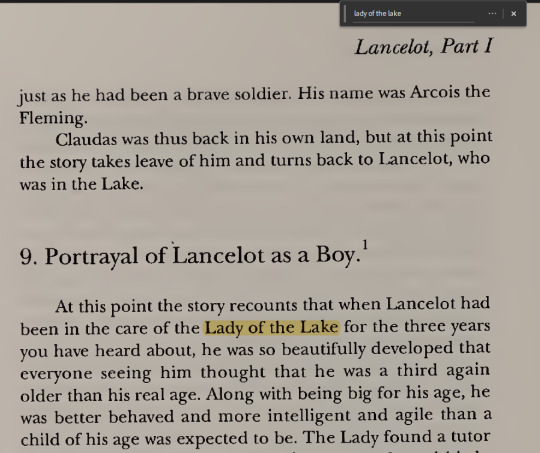
Index
In the very back of the final book of the Post Vulgate, there's an Index listing every named character [Ex: Gawain], location [Ex: Orkney Isles], entity [Ex: Holy Spirit], animal [Ex: Gringalet the horse], and language [Ex: Hebrew] mentioned in the entirety of the Vulgate Cycle. There you'll find a list of which book/chapter/page they appear in. Here are all the mentions of Gawain's horse in The Book of Merlin.

Chapter Summaries
Each book of the Vulgate Cycle has a Table of Contents with the chapter numbers and long, descriptive titles. That alone may give you an indication of what you want to read. However, at the back of the Post Vulgate, right before the Index, there's a list of every chapter in the Vulgate Cycle with a summary of events. That will give you more detail and may help you decide if you want to read in full.
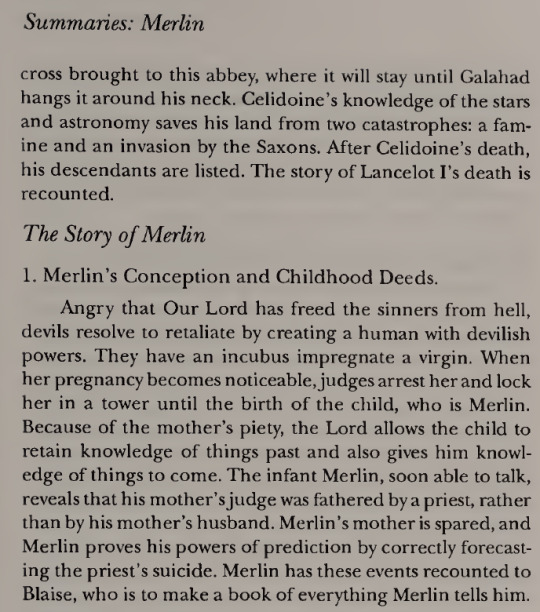
Skip
If it sucks, hit da bricks. The beauty of the Vulgate Cycle is that you don't need The History of the Grail or The Book of Merlin to understand what comes later. I enjoy them because History gives a ton of background to the religious themes the Grail Quest will eventually explore and sets up all the motifs way in advance and Merlin has the Orkney Bros as well as Yvain and Sagramore as kids which is fun. But the fact is you can begin with Lancelot I and you won't be lost. Lancelot I was written first, Merlin is a prequel, so it's optional, and the motifs of the Grail Quest are going to be heavy handed when you get there anyway without the added stuff from History. That's hundreds of pages you can skip if you want to! Norris J. Lacy, the head editor, and his translation team did a phenomenal job with footnotes throughout, so if a character off-handedly refers back to something, you can rely on them to leave a little note at the bottom for you to refresh your memory with. It'll even give you a chapter/page number if you want to refer back yourself. Here's a footnote referring to Agravaine's unnamed amie [his ladylove] who helped wing woman her sister to romance Gawain. That was 4 chapters prior to this moment.
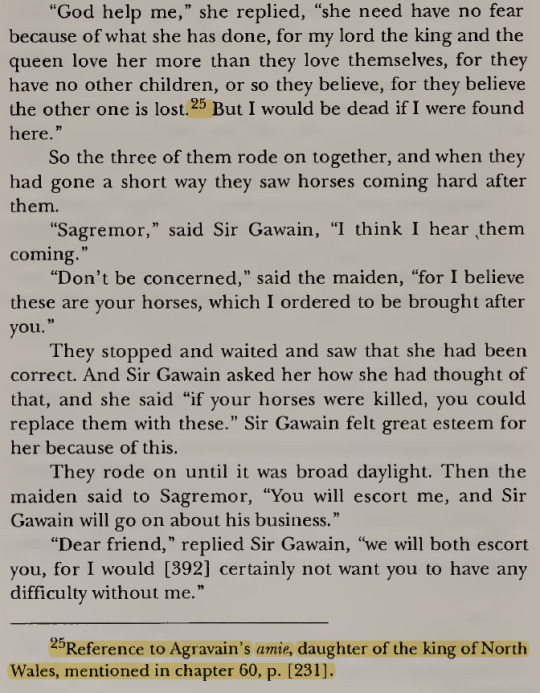
So there are plenty of ways to navigate the Vulgate Cycle and make it more digestible. That being said, it's translated so beautifully by Lacy and his team, that it reads like a modern novel. I have no doubt that once you get started, you'll become invested, and find it much easier to work through than you first thought. It's long-winded and character dense but it's fun. I do hope you're able to read it and understand why I love it so much! Thanks for this ask and I hope this helps. Have a great day!
#arthurian legend#arthurian legends#arthuriana#arthurian mythology#arthurian literature#the vulgate cycle#the vulgate#vulgate#post vulgate#quotes#resource#reading recommendations#my post#ask
111 notes
·
View notes
Text
Arthurian myth: Merlin (2)
A continuation of the loose translation of the "Merlin" article by Yves Vadé for the "Dictionnaire des Mythes Littéraires".
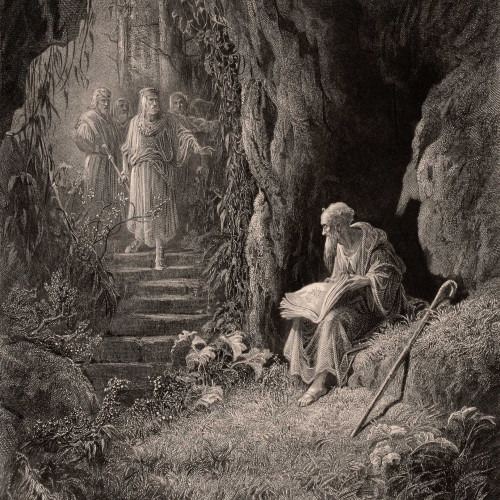
II/ Merlin in the Arthurian literature
As early as 1155, the Normand writer Wace transposed, for Alienor of Aquitaine, the “Historia Regum Britanniae” in French verse, in his “Roman de Brut”. He adds to the work the episode of the creation of the Round Table by Arthur, of whom Merlin will later become the prophet and the agent.
Merlin was barely mentioned by Chrétien de Troyes ; it is with Robert de Boron that he truly became the inspiration of the Grail’s knighthood. His work in verse, that contained at least the three romans known as “Joseph of Arimathea”, “Merlin” and “Perceval”, is partially lost in its original version, and it maybe even was unfinished. However, the prose translation of the “Merlin” was preserved, and seems to be quite faithful to Boron’s poem. The beginning of the roman takes back the motif of Merlin being born of an incubus demon, but it is now placed within a greater theological context: the demons wishes to produce an Antichrist, born of a virgin just like the Christ, in order to counter the Holy Incarnation. A demon managed, after some difficulties, to trick an honest young girl, but she immediately confessed her sin and she had the child baptized. From his father, the devil, Merlin received the knowledge of the entire past; and to counter this gift, God gave him the power to know the future. As such, Merlin is born with an universal knowledge. He uses it in the first months of his life to save his mother, threatened with burning at the stake ; then, at seven years old, he reveals to the usurper Vertigier the existence of the two dragons hidden under the foundations of his tower. He also reveals their meaning: the red dragon (Vertigier) will be killed by the white dragon (the young princes Pendragon and Uter, sons of the king Constant). Uter became king, and Merlin his advisor. He allows him to vanquish the Saxon during the battle of Salisbury, battle where Pendragon loses his life: Merlin had Stonehenge built in his memory, and Uter ruled under the name of Uterpendragon. A new element that would change the Merlin legend forever: it is through the idea and advice of Merlin that Uterpendragon has the Table of the Grail built, the “third table” after the one of Joseph of Arimathea, which itself was a copy of the table of the Last Supper. And, just like within Geoffroy’s work, it is thanks to Merlin that Uter can give birth to Arthur by uniting himself with the duchess Ygerne, that he marries soon after. Merlin raises Arthur in secret then he ensures his crowning and his rule. Merlin will keep assisting Arthur, so that both his kingdom and Christianity could prosper.
Visibly inspired by, if not written by, Robert de Boron, the “Perceval” of the Modène and Didot manuscripts give to Merlin a peaceful end, though an enigmatic one… After guiding Perceval through his quest, he announces the end of the enchantments within the Grail Castle. Once it is done, Merlin builds himself a home in the woods called “esplumeor” (a word with an unknown meaning). There, he escapes from both the flow of time and the sight of men, but he keeps making prophecies about what God asked him to reveal to humanity.
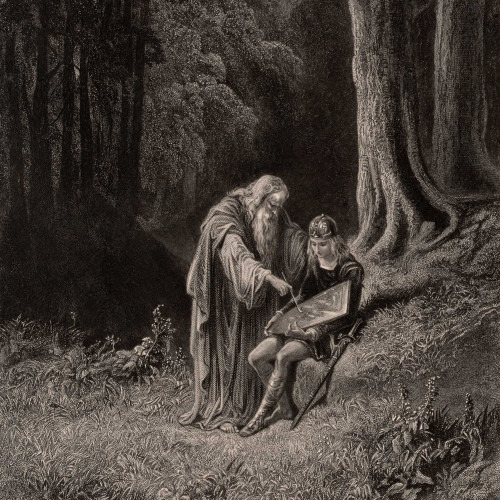
During the first half of the 13th century, two prose cycles formed themselves in France, each continuing Merlin’s story in a different way.
1) In the “Suite-Vulgate”, included within the greater cycle of the “Lancelot-Graal” or “Vulgate” (1215-1230), Merlin is the military advisor and strategist of Arthur in his battles against the barons that refuse his authority, then in his war against the Saxon, and finally in his feud against the emperor of Rome. Through Merlin, Arthur manages to marry Guenièvre, daughter of the king Laodegan, and he becomes the ruler in charge of the Round Table. But more importantly, it is here that Merlin encounters Viviane, the daughter of a lord named Dionas, at the edge of a fountain in the forest of Brocéliande. Wrapped around the tales of battles is a love story, during which Merlin allows Viviane to take away from him his magical knowledge. In order to keep Merlin all for herself, Viviane ends up capturing him within a “prison of air”, from where the prophet, now invisible, can still make his voice heard.
2) In the “Suite-Huth”, part of a cycle that was wrongly attributed to Robert de Boron, Merlin predicts the birth of Mordret, and the disasters caused by Balaain, the knight with two swords. It is Balaain that shall strike the “harmful blow” that will wound the king Pellehan and turn his kingdom in the “Terre Gaste”. Merlin is here much more involved in the adventures of the wandering knights than before. His role as an enchanter is put forward, as he is depicted commanding the wind, making the depiction of a dragon spit fire, open by magic the doors of a city, and preparing an enchanted bed that will remove from those that sleep within it their memory and their senses. The tale ends by the unfortunate love of Merlin and Viviane, which is a repetition of the love between Diana and Faunus. After bewitching Merlin, Viviane throws him into a vault whose stone cannot be removed. In his grave, Merlin screams one last time – and this last cry of the enchanter becomes the subject of an independent tale known as the “Conte du Brait”.
The first mention of Viviane is older than the “Suite-Vulgate”. She appears in the beginning of the “Lancelot” (or “Proper Lancelot”), under the name of Niniène, and she is depicted as a fairy of Bretagne that raised Lancelot in her wealthy domain hidden under a lake. Merlin appears here under a negative light. While his popularity is attested (it is said he was “so dreaded and so honored” by the people of Britany that all called him a “holy prophet” and common folks even called him a “god”), he is said to be “disloyal” and “deceiving” due to the nature of his father, and his knowledge is one of “perverse science”. The lady of the lake refuses his love out of wisdom, and she manages to trap him in “a cave within the dangerous forest of Darnantes”.
As such the character, that Robert de Boron tried to turn into the prophet of Christian knighthood, does not escape the ambiguity due to his composite origins, and which fits his genealogy, half-devil half-virgin. One can also see in his gift of shapeshifting a manifestation of his unstable personality, and of the contradiction of the several traits that compose him. This Proteus-like nature, certainly a remnant of the powers that were once attributed to the druids, allows Merlin to appear sometimes as a young man, sometimes as an old man, other times as a “woods-man/wild man”, and even as a great “branched stag”, as in the story of Grisandole (part of the “Suite-Vulgate”).
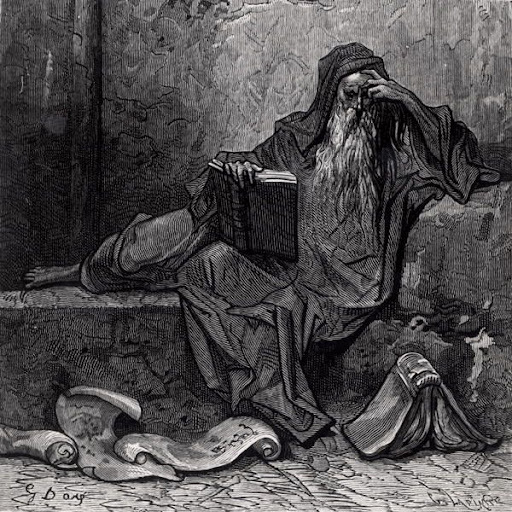
Built of successive additions, the tale of Merlin was reproduced, synthetized and translated, partially or entirely, by all the literatures of Europe until the end of the Middle-Ages. Even before 1250, the “Merlin” of Robert had been translated in the provençal language. The character also appears within numerous French verse romans of the 13th century: in “Fergus” (which places his lair in an isolated mountain), within “Le Chevalier aux Deux Epées”, within the “Roman du Hem”, within “Escanor”, within the “Roman de Silence” (where the Grisandole tale is found), and especially within “Claris et Laris”, which explains Merlin’s solitude by a crime he needs to expiate until his death. In the Prose Tristan (after 1240, Merlin takes care of Tristan, whose mother recently died, and gives him to a preceptor (just like he had done for Arthur in Robert de Boron’s text). Identified as a wizard, he builds a magical boat, the “nef de la joie”, for the king of Northomberlande. Outside of the knight-tales, a fairytale in verse of the beginning of the 12th century, “Du villain qui devient riche et puis pauvre”, also known as the “Dit de Merlin-merlot”, confirms the role among the “folk people” of Merlin as an embodiment of the supernatural.
The one that Dante called the “buon incantatore” was very popular in Italy, especially in relation to the work of Joachim of Flore. Among his apocryphal works there is an “Expositio Sibyllae et Merlini”. The tradition of Merlin as a prophet was enriched by a huge book of “Prophecies”, which mixed political predictions, sermons, and fictional stories. It was written in French between 1276 and 1279 by Venetian, probably a Franciscan. In the beginning of the 14th century, the Florentine Paolino Pieri mixed in his “Storia di Merlini” a tale of Merlin’s youth and the Italian translation of a part of the “Prophecies”. In 1480, Venice saw published six volumes of the “Historia di Merlino”, a great part also made of these prophecies supposedly made by Merlin.
In England, the “Merlin” of Robert and the “Suite-Vulgate” were recapped in a verse work known as “Arthour and Merlin” (1250-1300). Henri Lovelich gave an alternate version of this text in his “Merlin” (1430). A translation in Middle-English of the “Merlin-Vulgate” dates from the middle of the 15th century. Finally, sir Thomas Malory split the “Merlin” of Robert throughout the five first books of his “Morte d’Arthur”. This work, written in the prison of Newgate where Malory spent the last twenty years of his life, was printed in 1485 and constantly republished, and it ensured the fame of Arthur and Merlin within English-speaking countries.
In Germany, “Merlin und Seifrid de Ardemont”, by Albrecht von Scharfenberg (13th century) recaps Robert’s Merlin, with very important modifications (for example Pandragon and Uter are now the sons of Merlin). Other translations appeared in Holland. In Spain, the cycle of the pseudo-Robert de Boron was translated in the 14th century by the brother Juan Vivas, while the “Demanda del Sancto Grial” included a “Baladro del sabio Merlin”, derived from the lost “Brait de Merlin”. A Castilian version appeared at Burgos in 1498, and then another was published in Seville in 1535.
#merlin#merlin the enchanter#arthuriana#arthurian myth#arthurian literature#arthurian legend#medieval literature
24 notes
·
View notes
Note
What is the story of Lancelot and Guinevere??? Do they end up together or not ?? And what about her husband Arthur ??
I'm really loving this arthurian tales and don't know what to read or refer , can you please tell me about it or the source of it so that I can read it ? Also this is just like Alicole especially the devotion and the absolute adoration!!!
If you want an accessible version of The Knight of the Cart, my first rec is the LibriVox audiobook here. That's how I "read" it; I found it pretty approachable. There's also The Knight of the Cart Comedic Retelling by @mayapleiades, a pretty faithful and detailed recapping.
What is the story of Lancelot and Guinevere?
So the thing about Arthuriana is that it's all "fanfic"; there's no "canon". Throughout the middle ages, various authors wrote various stories, which were variously retellings and add-ons to earlier stories.
The specific story I've talked about to date is The Knight of the Cart by Chrétien de Troyes (+ Marie de Champagne + Godefroi de Leigni). That's the OG story, where the idea of their affair began. That was written circa 1177–1181.
The next adaptation of the idea was the Vulgate Cycle (c. 1210–1235). I haven't read it yet. I want to, but I'm still looking for an accessible version of it.
"Do they end up together or not?"
At the end of The Knight of the Cart, they are continuing their affair.
In later texts by later authors, things go less smoothly, their affair is discovered, and it kicks off the downfall of Camelot.
"What about her husband Arthur?"
That's an interesting question, and not one that The Knight of the Cart covers.
I talk about it here, but basically the original idea of their affair came from Marie de Champagne. She thought adultery was sexy and nonproblematic. (Or at least, she wasn't interested in hearing the problematic aspect condemned.)
Marie commissioned her fic from Chrétien, who we believe was uncomfortable with this subject matter. I think Chrétien was against adultery and didn't know how to handle the topic of sympathetic adultery, so he just... stayed silent on the issue.
The topic of adultery is weirdly absent from The Knight of the Cart, despite being arguably the main plot. It's simply not discussed. Lancelot and Guinevere never talk about it, never even think about it. Lancelot is fastidious about other aspects of honor, but he's totally down for flagrantly cuckolding his king without a second thought. (Which is honestly kind of iconic and I love it.)
It appears like virtually no one else shared Marie's vision of dead dove adultery. In later versions of the story, adultery is wrong and it needs consequences.
30 notes
·
View notes